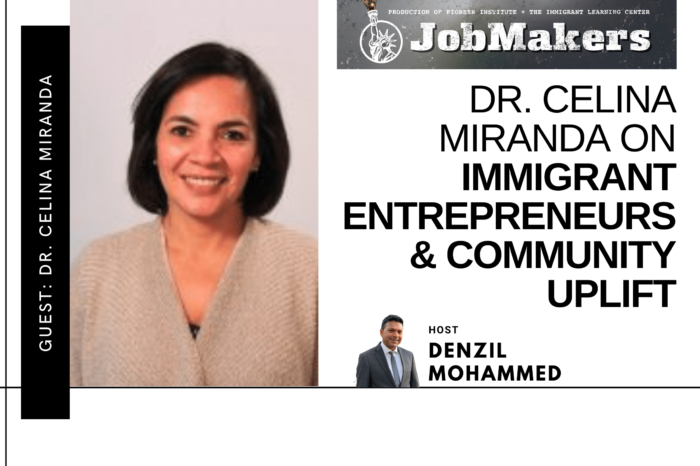Dr. Celina Miranda on Immigrant Entrepreneurs & Community Uplift
/in Economic Opportunity, Featured, JobMakers /by Micaela DawsonThis week on JobMakers, host Denzil Mohammed talks with Dr. Celina Miranda, executive director of the Hyde Square Task Force in Jamaica Plain’s Latin Quarter, today one of the most diverse neighborhoods in Massachusetts. Dr. Miranda knows keeping the kids in school, firm in their cultural identity, and welcoming to all others is crucial to maintaining the area’s renewed stature. And she knows how hard their immigrant business owners, from countries as diverse as Ethiopia, the Dominican Republic and Guatemala, are working to make that happen. This week, we’ll look at how immigrant entrepreneurs contribute to sustaining their neighborhoods and people economically, philanthropically, and socially. Dr. Miranda hopes the example of Jamaica Plain’s Latin Quarter and the role of its business owners would be replicated in communities across the U.S. to help overcome our heightened divisiveness, as you’ll learn now on JobMakers.
Guest:
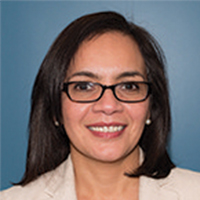 Celina Miranda is the executive director of Hyde Square Task Force. Miranda has spent her career engaged in work that enables underserved communities to access the resources and opportunities they need for a better future. Miranda joined HSTF from her position as senior program officer at the Richard and Susan Smith Family Foundation, where she managed grants in education and economic mobility since 2012. Prior to this, she was the vice president and charitable giving manager for BNY Mellon Public Affairs. As a program associate at the Hyams Foundation, she managed youth development grants and initiatives. Miranda teaches at Boston University School of Social Work and is a trustee of the Rutland Corner Foundation, which supports girl-serving programs throughout Greater Boston. She was named a “Boston Latino on the Move” by the Boston Business Journal. Miranda received her Ph.D. in social work and sociology from Boston University. She earned an MSW and Ed.M. from Boston University, and a BA from Smith College.
Celina Miranda is the executive director of Hyde Square Task Force. Miranda has spent her career engaged in work that enables underserved communities to access the resources and opportunities they need for a better future. Miranda joined HSTF from her position as senior program officer at the Richard and Susan Smith Family Foundation, where she managed grants in education and economic mobility since 2012. Prior to this, she was the vice president and charitable giving manager for BNY Mellon Public Affairs. As a program associate at the Hyams Foundation, she managed youth development grants and initiatives. Miranda teaches at Boston University School of Social Work and is a trustee of the Rutland Corner Foundation, which supports girl-serving programs throughout Greater Boston. She was named a “Boston Latino on the Move” by the Boston Business Journal. Miranda received her Ph.D. in social work and sociology from Boston University. She earned an MSW and Ed.M. from Boston University, and a BA from Smith College.
Get new episodes of JobMakers in your inbox!
Read a Transcript of This Episode
Please excuse typos.
Denzil Mohammed:
I’m Denzil Mohammed. And this is JobMakers.
Denzil Mohammed:
How did Jamaica Plain, a neighborhood of Boston, Massachusetts, go from being one of the most crime-ridden in the US to one of the safest and most desired because immigrant entrepreneurs and others in the community said enough and did something about it. And this started with the youth. It is one of the many ways immigrant business owners give back to their new homeland. They create jobs, mentor, sponsor, and lead for Dr. Celina Miranda, executive director of the Hyde Square Task Force in Jamaica Plain’s Latin Quarter, today one of the most diverse neighborhoods in Massachusetts. She knows keeping the kids school educated and firm in their cultural identity and welcoming to others is crucial to maintaining the areas renewed stature. And she knows how much of their immigrant business owners from countries as diverse as Ethiopia, the Dominican Republic, Guatemala are working to make this happen. This week. We look at how immigrant entrepreneurs contribute in another way, sustaining their neighborhoods and people economically philanthropically socially, and frankly humanly Dr. Miranda hopes, the example of Jamaica Plain’s Latin quarter, and the role of its business owners would be replicated in communities across the us to help overcome a heightened divisiveness. As you learn now on JobMakers,
Denzil Mohammed:
Dr. Celina Miranda, executive director of the Hyde Square Task Force in the Jamaica Plain neighborhood of Boston. Welcome to JobMakers. How are you?
Dr. Celina Miranda:
Good. How are you? Thank you for having me.
Denzil Mohammed:
I’m doing very well. So you are the director of the Hyde Square Task Force in Jamaica Plain, you know, seeks to build up the community essentially from the youth all the way up. And one of your big, your biggest accomplishments in in recent history has been to designate the area, the Latin quarter of Boston. Give us the story of the Latin quarter.
Dr. Celina Miranda:
Sure. So the Latin quarter well, we became known as the Latin back in 20 16 when Boston city council actually voted unanimously to identify this particular segment or area in Jamaica, plain in the neighborhood of Jamaica, plain us Boston’s Latin quarter. But the impetus really began by our young people wanting to have an area that they’ve come to love over many, many years, be recognized for the Latinx contributions that have been made over decades. And so that’s where it started. And then in 2018, we became recognized as a Massachusetts cultural district. So we are one of you know, 40 plus cultural districts in the state and recognized as the Latin quarter. And it really does allow us to uplift the contributions that the Latinx immigrant community has been making to the, this particular neighborhood and really Boston overall since about the 1960s.
Denzil Mohammed:
Wow. Since 1960s. So delve into that a little bit with me, what has been the impact of immigrants in your quarter of Jamaica? Plain?
Dr. Celina Miranda:
Sure. So, you know, since the 1960s, there have been waves of folks that have arrived here from, you know, originally from Guba Cuba the Puerto Rico, and most recently the Dominican Republic, but we’ve also had groups and pockets of central American in south American immigrants that have made this particular corner of Boston, their home over the years that has changed in definite right now we have predominantly a Dominican population that lives in this area and this I think over time, over the decades, that immigrants from, from, you know, Latinx immigrants have been coming here, this has developed into a hub of Latinx culture. And what I mean by that, you can find, you know, businesses here that are Latinx owned or run and you can sort of smell, you know, right. The smells of the Dominican Republic. You’ll, you’ll have them here. Pastries from the Dominican Republic are here. The music, cetera. So really it’s a, it’s a hub for Latin culture and in opportunity to affirm and continue to uplift. Like I said, the contributions that Latinx immigrants have made over over many, many, many years.
Denzil Mohammed:
I have such good memories of having oxtail at El Oriental de Cuba and pinatas at this place across from the dogie daycare tales. So these immigrant businesses, what impact have they had over the, over the past decades? You mentioned the first wave from Cuba, then Puerto Rico. And just to be clear, Puerto Ricans, aren’t immigrants, they’re American citizens. Yeah. And Dominicans they’ve really shaped the identity of the neighborhood. Talk a little bit about the immigrant businesses in the Latin quarter.
Dr. Celina Miranda:
Yeah. So definitely, like I said, you know, they really have shaped the identity of the neighborhood and have created what we now call the Latin quarter. I think without their contribution, we wouldn’t have the vitality of the neighborhood that we do. And really, if I can take you back to the 19 1990s, this actually this corner of Jamaica, plain was actually known as the the cocaine capital of new England. So there was a lot of drugs drug trafficking here and violence in the neighborhood. And really it’s the contributions. I think of businesses and, and residents that came together that began to transform the neighborhood into into what it is today. And so businesses have been here for Latinx own businesses or run businesses have been year for a very long time. And some of them, you know, very large ones, including El Mundo which was here, they were headquartered here until very recently. And we also had a high, low grocery store that was here for many, many, many, many years where folks would Trek from all over Boston to come here and do their grocery shopping. So they have been a presence here in the neighborhood for such a long time and added to the bustling feel of the neighborhood and you know, the footprint that we have and contributed to, to it being the district that it is today.
Denzil Mohammed:
I think of the entrepreneurial spirit of immigrants. Immigrants are twice as like these start a business. For many of them, you know, they may not have a choice, but to get into their own business because their credentials don’t transfer. What have you, and the legacy of entrepreneurship in Jamaica, plain, and particularly the Latin quarter is really fascinating to me several years ago at our immigrant entrepreneur awards, we honored the Mars Pimentel who runs ultra beauty salon in Jamaica, plain stone store from, from where I live on south Huntington Ave. And her story of entrepreneurship began with her father who moved here from the Dominican Republic and started ment market, which still exists today. And now she has her own gleaming, beautiful, bright business, and is fostering entrepreneurship in the young people who work with her. Talk a little bit about the economic impact up until today, because we’ve really seen how the businesses have flourished over time and become more elegant and, and more diverse, you know, a doggy daycare, for instance, what’s been the economic impact over the years.
Dr. Celina Miranda:
Yeah. I mean, you know, right now, actually yes, of 2019, I believe approximately half of the 104 businesses along center street in the Latin quarter are Latinx owned and, or, and, or managed. Right. so definitely I think they have been a critical component of the the financial vitality of this corner of, of Boston, but even in beyond, right. Because, you know, we have sort of, for instance, a barbershop owner just down the down a couple of buildings from where we are. And this is where his business is. This is where he does his work and mind you, he doesn’t live here and we can talk about why he can’t afford a, have a house here. But that might be another podcast. But really the reality is that they continue to contribute to, to the energy and to the to the financial stability of this particular area.
Dr. Celina Miranda:
And like you said, I think we have seen transformation. We have seen changes over the years that you have sort of a different a much more racially and ethnically diverse population that is visiting that are visiting those businesses. Right. So, you know, the doggy daycare, it’s not just for your Dominican dog owner, it’s for anyone who has a dog and needs somebody to take care of their dog during the day. So definitely that is the case. So they’ve been, you know, crucial, I think not only for the wellbeing of those particular families, but also for others who are able to work at these physicists, et cetera,
Denzil Mohammed:
They’re creating local jobs,
Dr. Celina Miranda:
Correct.
Denzil Mohammed:
At, at all levels for all people. And I think, you know, I go back to tales, the dogie daycare that we’re talking about, and I know that the owner of Jesse Fise also from Dominican Republic she hires people who come out of prison in order to get for them to get start a stable life again. So they’re creating opportunities for a wide variety of people. And, but it does beg one question for a lot of Americans who wonder why immigrants tend to congregate with other immigrants from their home countries. I mean, this is something we’ve seen throughout us history, you know, China, China towns, Korea towns now in LA, in Lowell, you have a Cambodia town. But explain to us born people, why immigrants move to places where the immigrants from their home countries already are. And yeah. Does, does that, you know, from the uneducated mind, it might seem to inhibit integration research says no.
Dr. Celina Miranda:
Yeah. So, you know, obviously one argument is that when immigrants first enter into the country, they will go where others are, because that’s where they can find information, information on jobs, right? Where can I get a job housing in terms of where’s the best place for me to live? Where can I afford to live and other resources? So it’s a source of information that is so key, right? That’s where you can go and find the information. And importantly, you can find the information and a language that you understand that you recognize, which makes the transition in through the country easier for are some, the enclave can be helpful, but it will only get you so much not because it’s an ethnic enclave. I think I wanna make sure that that’s clear. It’s not because it’s wrong to be with your group, but it’s more because you have redundancy in networks.
Dr. Celina Miranda:
I think basic social capital theory tells you that you wanna have sort of diverse networks that can connect you to resources that you otherwise wouldn’t have connections to. Right. So and there’s been actually, you know, social programs that have tried to do some around this and making sure that you bring people together that have, that don’t have redundancy in those networks so that they can help one another and say, oh, by the way, you know, have you looked into that program over there, that’s offering scholarships for kids that are interested in X. And so therefore you go there, but you wouldn’t know if you’re just to the same people who know the same information who have the same information you do. So I think from, from that perspective, I think, you know, definitely it’s not just for immigrant groups. I think it’s in more generally, right? We all benefit from having diverse networks so that we can access new information, new resources,
Denzil Mohammed:
Many people in the US don’t know what it’s like to move to another country. The incredible cultural differences language barriers, laws, and, and regulations there are so many things that are different. And if you ha the importance of social capital is so the bulk of your work at the Hyde Square Task Force focused on the youth many of them, of course, immigrants as well. So when it comes to their education and wellbeing, what are you doing to ensure that they thrive? And, you know, why was there need for this task force to begin with?
Dr. Celina Miranda:
Yeah, so we started 30 years ago in part, you know, in part was in response to what I said in terms of the 1990s and the state of the neighborhood, right. We having, you know, at that time being called the cocaine capital of new England, and also recognizing that it was a neighborhood that was not being heard by elected officials that was not being seen in the way that we wanted to be seen. So that’s how we started. We started by a group of neighbors who were dissatisfied and wanted to make a difference very early on. However, we recognized that young people needed to be that at the center of that transformation. So we have been focused on working with young people to create positive change in our community since the very beginning of our organization. And we continue to be very invested in that.
Dr. Celina Miranda:
Our strategies have changed over the years and now, you know, we focus on Afro and arts and culture as a vehicle by which we engage young people in the out of school time. However, as a youth development organization, a creative youth development organization, we are invested in making sure that our young young people are successful in graduating high school and also begin planning for their future. And we help them with that transition. So we make sure that they stay on track to graduate high school, begin planning for post-secondary education or training, whatever that may be. And then we also do college coaching because most of the student that we work with are first in their families to go to college. And so they need the added support, the added guidance, so that they’re able to navigate higher ed institutions as successfully as possible so that they can complete their studies.
Denzil Mohammed:
You’re building up social responsibility, you’re bringing up leadership qualities obviously academics and creativity. What has been the role of immigrant entrepreneurs specifically in this work?
Dr. Celina Miranda:
Well, you know, it, well, the MAs you, you named her earlier. She was actually a and was on our board for many, many, many years. So in that sense, right, it’s giving back, she was giving back and, and serving as a role model for our young people. So that’s one very micro, you know, example of how, how they have contributed. But now I think, you know, when you step back a they continue to be so critical again, as role models for our, for our young people. But also as a great resource, they continue to help us sort of do the cultural you know, arts and cultural work that we’re doing and that they partner with us all the time as we do our cultural events. I haven’t talked about sort of that aspect of our work is that in addition to working direct way with young people, we are also the managing partner of the cultural district of the Latin quarter. And so through that work, we have a series of annual events that we bring to the neighborhood and you know, business owners are a big part of that. They’re also partners in our thinking, as we continue to think of what the Latin quarter can be and the resource, the Latin quarter needs, they are key partners in creating that vision for the Latin quarter.
Denzil Mohammed:
So this is their way of giving back. And they’re giving back in, in many different ways, not just creating jobs, but sponsoring events, being role models fostering, you know, a, a, a more success mind spirit in young people. I think that’s just absolutely terrific. And the, the kind of relationships that you’ve been able to foster over the years toward this end is just absolutely extraordinary. Finally, I, you know, I did a lot of digging into the Latin quarter cuz it’s, I just, it’s just fascinating. And one word that emerged a lot when talking about the Latin quarter is coexistence. What example can the Latin quarter experience offer other parts of the country, not just immigrant areas you know, their refugees and immigrants are settling in areas that were previously not settled by immigrants and refugees. How, what is the Latin court experience regarding coexistence?
Dr. Celina Miranda:
Yeah, so, you know, I think, you know, I was reflecting a lot on this concept and thinking about the fact that, you know, carving out places or public spaces in particular where people from varying backgrounds can come together in a safe way, I think is essential to strengthening the fabric of any city, but really the fabric of our country. I think divisiveness is so has been so much that I think where we have been, you know, sort of the, this constant pinning each other you know, against one another. And I think that doesn’t abode well for anyone. And so I really do think that, you know, the opportunity to create spaces where it is safe to come together, it is safe to coexist to use the word. These spaces need to be open and inclusive for all people.
Dr. Celina Miranda:
So when we think about the Latin quarter, I hope that your listeners take away that the Latin quarter is not just for the Dominican immigrant. It is not just for, you know, the Cuban immigrant. It really is about a space where we welcome and we want people to come and experience that, that Latin, you know, that Afro Latin traditions and culture, and sort of get to know it in a way that is respectful. Of course, you know, I always think about that. You know, it’s important just to, to give respect to groups, honestly, here in our neighborhood, the newcomer is your younger younger folks who are moving to the area who are not from many of them are not from Boston, they’re coming from other are parts of the country. And most of them are not Latin X. And so, you know, really thinking about how do you create an, a, an opportunity for them to come and, and learn about the history of the neighborhood and, and, and, and become part of the fabric of the neighborhood in many ways, without taking away it’s it’s history without erasing what it has been.
Dr. Celina Miranda:
And I think that is, is, is important. And I think it needs to, it should be replicated everywhere, everywhere that we go. I think there should be a Latin quarter in my opinion, but that’s just me
Denzil Mohammed:
A welcoming space for everyone to be able to participate and learn and thrive. Right?
Dr. Celina Miranda:
Yes. You know, and like I said, respectfully of one another
Denzil Mohammed:
Hear hear Dr. Miranda, thank you so much for joining us on the Jobmakers podcast. We really appreciate your work with the Hyde Square task force and what you continue to do for Jamaica Plain and beyond. Thank you.
Dr. Celina Miranda:
Thank you. Thank you so much for having me.
Denzil Mohammed:
Jobmakers is a weekly podcast about immigrant entrepreneurship and contribution produced by Pioneer Institute, a think tank in Boston and the Immigrant Learning Center in Malden, Massachusetts, a not for profit that gives immigrants a voice. Thank you for joining us for today’s insight for conversation on how immigrant entrepreneurs are uplift communities with their work in philanthropy. If you know an outstanding immigrant entrepreneur, we should talk to email Denzil that’s, D E N Z I L @jobmakerspodcast.org. I’m Denzil Mohammed. Join us next Thursday at noon for another Jobmakers.
Recent Episodes:
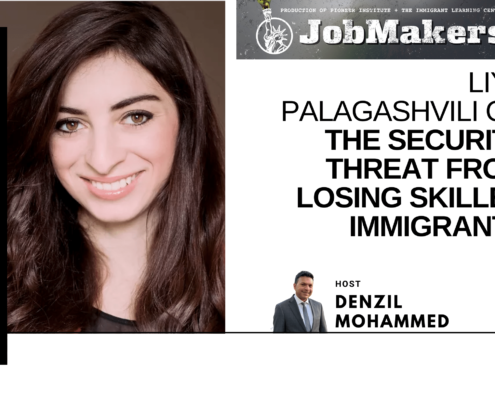
Liya Palagashvili on the Security Threat from Losing Skilled Immigrants
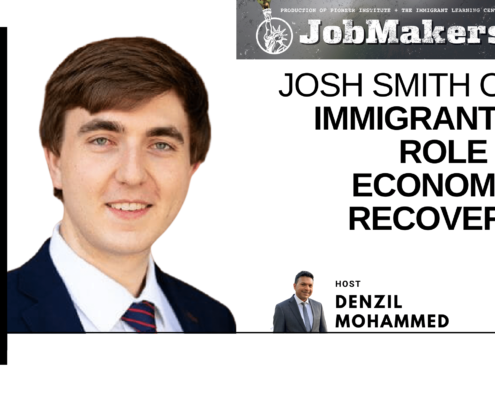
Josh Smith on Immigrants’ Role in Economic Recovery
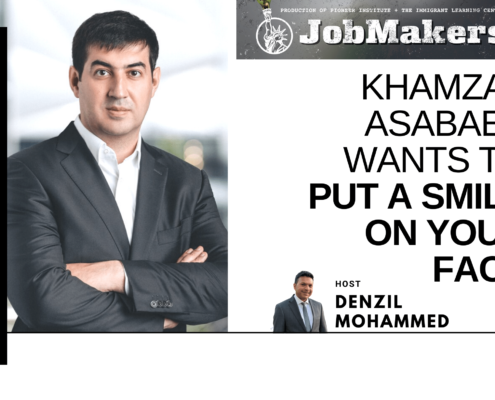
Khamzat Asabaev Wants to Put a Smile on Your Face

April Ryan Paints Her Way to Success
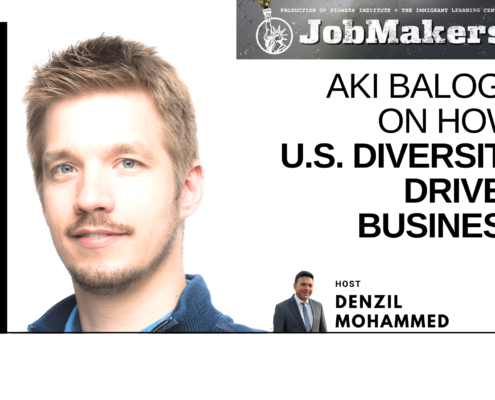
Aki Balogh on How U.S. Diversity Drives Business
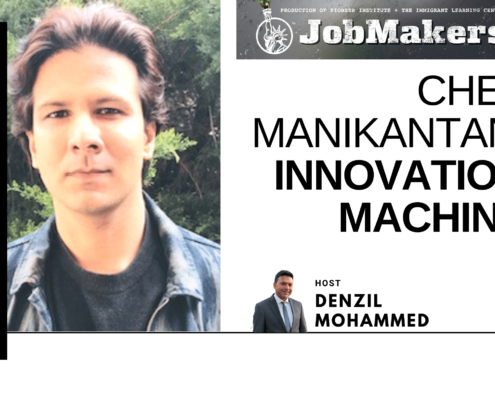
Chet Manikantan: Innovation Machine
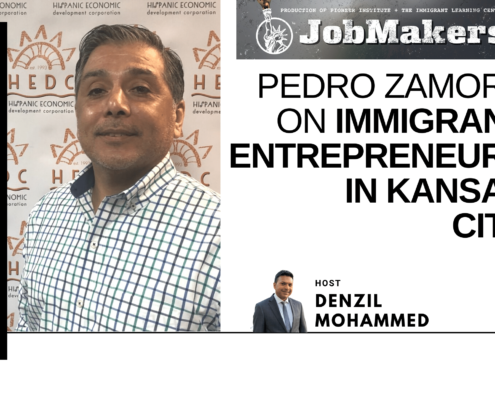
Pedro Zamora on Immigrant Entrepreneurs in Kansas City
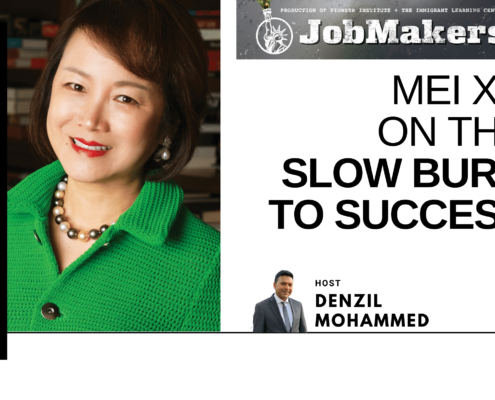
Mei Xu on the Slow Burn to Success

